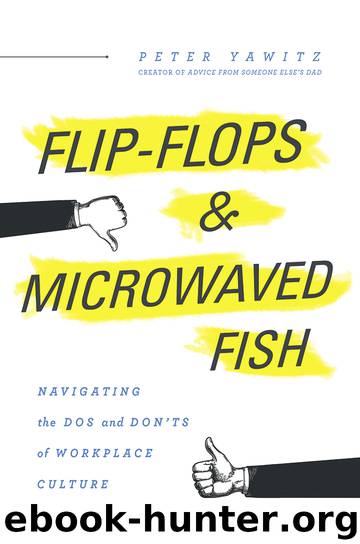Flip-Flops and Microwaved Fish by Peter Yawitz

Author:Peter Yawitz
Language: eng
Format: epub
ISBN: 9781626346833
Publisher: Greenleaf Book Group Press
Published: 2020-03-21T16:00:00+00:00
Fixing Common Writing Errors
Put modifiers next to what they modify. When you start a sentence with a clause that refers to something, the thing you’re referring to should go right after the comma.
Example:
As an expert in the field, the sewer should be cleaned.
Here the meaning would be the sewer is the expert in the field. A better sentence would be:
Based on my expertise, I believe the sewer should be cleaned.
Here’s a sentence I remember from my tenth-grade grammar book:
Walking across the campus, the library met my gaze.
In the world we inhabit, libraries have neither legs nor eyes. The major problem here is that the main (pro-)noun, “I,” is nowhere to be found. If you started to write the sentence entirely over and started with “I” you’d get: I saw the library while I was walking across the campus.
Who stole my whom? Don’t quote me on this, but the word whom will likely be gone within 100 years if not sooner. Most people aren’t sure when to use it, and when you’re speaking, you’re most likely going to say “who” anyway, even if you know it might be wrong. The other thing some people do is make a weird sound, cough, or wipe their mouth at the end of saying the word “who,” so their audiences won’t know if they’re actually getting it right.
But here’s how to get it right. Every noun or pronoun in a sentence has to match up with a verb. The word “who” in a clause would also like to pair up with any available verbs once the nouns and pronouns have paired up with other verbs. If there’s a free verb left, “who” can grab it and go to the party. If “who” can’t find any available verbs, it must turn itself into “whom.”
Example:
The people who came from Mars had funny accents.
Let’s match up nouns and verbs. “People” goes with “had.” That was pretty easy since the basic sentence is “The people had funny accents.” The clause that contains “who” has the only verb left in the sentence: “came.” “Who” happily pairs up with “came,” and the sentence is correct as written.
Here’s another example:
The people who Johann met came from Zanzibar.
Again, let’s match up nouns and verbs. “People” goes with “came,” since the basic sentence is “The people came from Zanzibar.” Inside the clause that contains “who,” “Johann” can match up with “met.” The word “who” searches for available verbs, but alas, there are none left. “Who” has to become “whom.”
The correct sentence then is this:
The people whom Johann met came from Zanzibar.
Maintain parallel construction in sentences and lists. PowerPoint has made life easy for people preparing presentations because of its automatic prompts that help you fill in bullet points. I wish PowerPoint would have a warning bubble saying, “Don’t forget that your bullets should be grammatically parallel!” I can only dream.
Look at this slide:
Download
This site does not store any files on its server. We only index and link to content provided by other sites. Please contact the content providers to delete copyright contents if any and email us, we'll remove relevant links or contents immediately.
| Ethics | Etiquette |
| Fashion & Image | Health & Stress |
| Motivation & Self-Improvement | Work Life Balance |
| Workplace Culture |
Tools of Titans by Timothy Ferriss(8396)
Change Your Questions, Change Your Life by Marilee Adams(7783)
Deep Work by Cal Newport(7083)
Playing to Win_ How Strategy Really Works by A.G. Lafley & Roger L. Martin(6306)
Man-made Catastrophes and Risk Information Concealment by Dmitry Chernov & Didier Sornette(6019)
Big Magic: Creative Living Beyond Fear by Elizabeth Gilbert(5772)
Digital Minimalism by Cal Newport;(5765)
Ego Is the Enemy by Ryan Holiday(5450)
The Slight Edge by Jeff Olson(5417)
The Motivation Myth by Jeff Haden(5212)
The Laws of Human Nature by Robert Greene(5208)
Stone's Rules by Roger Stone(5088)
Tuesdays with Morrie by Mitch Albom(4784)
Eat That Frog! by Brian Tracy(4540)
Rising Strong by Brene Brown(4459)
Skin in the Game by Nassim Nicholas Taleb(4249)
The Money Culture by Michael Lewis(4207)
Bullshit Jobs by David Graeber(4190)
Skin in the Game: Hidden Asymmetries in Daily Life by Nassim Nicholas Taleb(4007)
